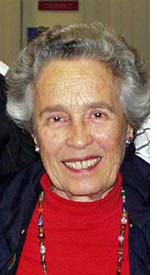By Eileen Wingard

LA JOLLA, California — Some remarkable treasures of poetic talent were unearthed during this year’s Jewish Poets —Jewish Voices evenings! This third year of the poetry series in the Astor Judaica Library at the Lawrence Family Jewish Community Center included local song writers as well as local poets.
On February 22, Mexican-born Pepe Stepensky read and translated into English his Spanish lyrics which Zeji Ozeri set to music. Ozeri sang the songs, accompanying himself on guitar. In addition, Janet Tiger read her original poetry, much of it written during the time she was battling breast cancer. Both Stepensky and Tiger are recognized playwrights and Ozeri is a media personality and song leader at Ohr Shalom Synagogue and the Ken Community.
With dramatic fervor, Odessa-born Ilya Kaminsky read on March 22 selections from his award-winning collection, Dancing in Odessa. Kaminsky teaches creative writing at San Diego State University. Lilah Sugarman, a teacher at Ohr Shalom Religious School and a recent SDSU graduate, read her poems. Yael G’mach concluded the program with original songs in English and French. Her seductive voice was reminiscent of the great French chanteuse, Edith Piaf.
At both evenings, there were open mike participants. The first evening included a mother and her two middle school daughters, all published poets! Former featured poets such as Trudi Richman and Sara Appel-Lennon attend frequently and contribute their works during the open mike as does Michael Horvitz, a member of the organizing committee and Joy Heitzmann, master of ceremonies for the series.
Here are three poems read during the last two evenings of the 2011 series, Jewish Poets—Jewish Voices:
ANNIVERSARY by Janet Tiger
What is love?
As I sit before the anniversary
Of my marriage
I have—as usual—more questions
than answers
The movies and TV never show much
Of a ‘stick-to-it-ive’ love anymore
The kind that lasts
Through trouble
The kind of love that forges steel
Not melts butter
When we first met
I knew he was the one
To father my children
How did I know?
The way they tell you you’ll know
You know.
But nothing prepares you
For the down times
For depression
For money troubles
For illness
For your children getting sick
So when you hit these bumps in the road
It’s an untested vehicle
Will the tires blow—or the transmission?
Will the brakes work—or the windshield wiper
Stay on too long?
How can we know these answers?
We don’t/
And so we drive on
Together still
Through life’s joys and skids
And crashes
And knowing a little more about this sturdy person
Next to us in bed.
I stood by you
And you stood by me
Through some tough turns
And now, when the going looks
A little easier
We work on fixing up the vehicles
Solving problems that made some of the trip
Harder
Laughing because we got through this lap
Still in each other’s laps
What will the future hold?
Only God knows.
Will I still be able to write this poem next year?
Only God knows.
But I do know something very important
I still love him
And I know—I wouldn’t have changed one minute.
And that is my greatest gift.
*
WHY SQUARED by Lilah Sugarman
His foot slaps pavement, his leg swings
like the rotating arm of a clock, metal bone
Within will never bend. He told me last night
God was the exponential why. So we
formulated questions. Why, why? Why me?
he asked. He told me if he could do any-
thing right now he would want to walk around
without pain in his leg. I pictured him
yesterday in front of a Lego-like building,
crutches under arm. The building, less colorful,
more symmetrical than Legos, like the Kotel
prayers stacked. I pieced together his image
as he stood, leg in brace, looking to his left.
DANCING IN ODESSA by Ilya Kaminsky
We lived north of the future, days opened
letters with a child’s signature, a raspberry, a page of sky.
My grandmother threw tomatoes
from her balcony, she pulled imagination like a blanket
over my head. I painted
my mother’s face. She understood
loneliness, hid the dead in the earth like partisans.
The night undressed us (I counted
its pulse) my mother danced, she filled the past
with peaches, casseroles. At this, my doctor laughed, his granddaughter
touched my eyelid—I kissed
the back of her knee. The city trembled,
a ghost-ship setting sail.
And my classmate invented twenty names for Jew.
He was an angel, he had no name,
we wrestled, yes. My grandfathers fought
the German tanks on tractors, I kept a suitcase full
of Brodsky’s poems. The city trembled,
a ghost-ship setting sail.
At night, I woke to whisper: yes, we lived.
We lived, yes, don’t say it was a dream.
At the local factory, my father
took a handful of snow, put it in my mouth.
The sun began a routine narration,
whitening their bodies: mother, father dancing, moving
As the darkness spoke behind them.
It was April. The sun washed the balconies, April.
I retell the story the light etches
into my hand: Little book, go to the city without me.
*
Wingard is a freelance arts writr based in San Diego. She may be contacted at eileen.wingard@sdjewishworld.com